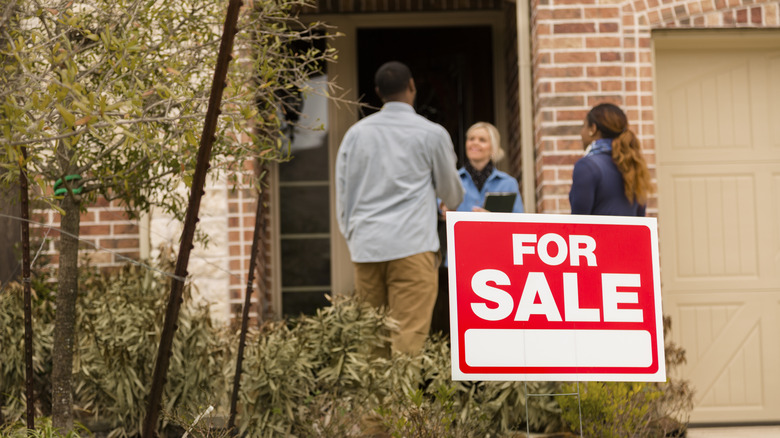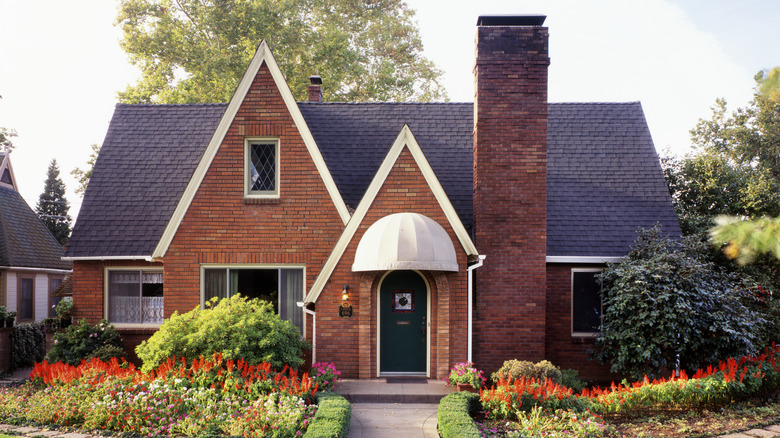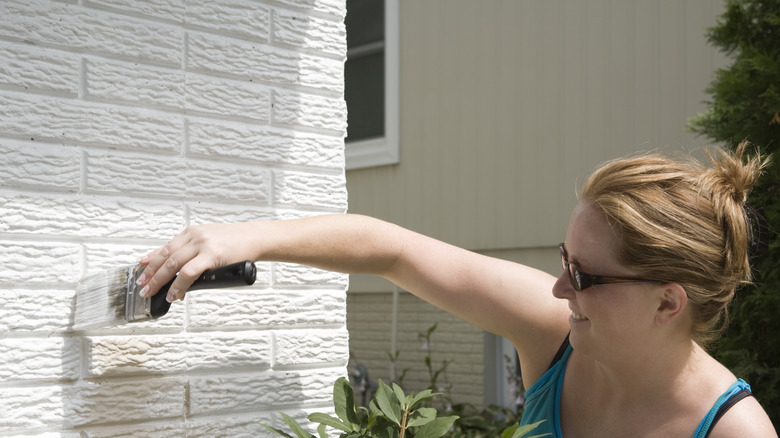The Long-Term Effects Of Brick On Home Resale Value
Most of us learn in childhood that brick provides a sturdy and reliable structure that keeps occupants safe, no matter what big bad wolves are lurking outside. Offering more than just a classic and elegant look, bricks are more fire and weather-resistant than other building materials like stucco, wood, or vinyl. It doesn't rot or fade, either, requiring less upkeep over the years with nothing more than an infrequent scrubbing or power washing session to brighten up your brickwork. As the real estate market is expected to sharply rise in 2025, we wanted to know more about the long-term effects of brick on a home's resale value.
"Brick exteriors are a great way to add value to a person's home," Rachel Stringer of Raleigh Realty told House Digest in an exclusive interview. "This is a classic timeless feature that many buyers will be happy with." Stringer added that brick improves curb appeal, which immediately impacts a home's desirability with potential buyers.
Along with minimal upkeep, brick homes also offer increased energy efficiency which can reduce utility costs. Brick stabilizes indoor temperatures due to its thickness, which lessens the load on your HVAC unit throughout the year. Brick homes outperforming powerful winds and extreme weather isn't just a fairytale: Studies have consistently shown that clay brick veneer is better at controlling moisture, resisting earthquakes, and offering impact resistance against high velocity hurricanes than other residential exteriors.
A brick home can save you money over time
Whether you're purchasing an existing brick home or building a new one, it is important to understand how the cost of brick really breaks down over time. Although building with brick is undoubtedly more expensive at the outset, the average resale value of a brick home is at least 6% higher than those constructed of other materials. Brick homes also appreciate in value more than those with vinyl siding. This may be due to the fact that brick masonry is rated for a 100-year lifespan that doesn't require repair or replacement due to rotting. Along with saving money on maintenance, it is also less expensive to insure a brick home because the material is less likely to be damaged by fire, wind, or flooding.
There are many important factors to consider when purchasing a home. "The first will obviously be the cost, followed by location," according to Rachel Stringer in her exclusive interview with House Digest. "These are the first two things we ask potential buyers."
She reminds sellers, "Appearances are everything. A well maintained, attractive exterior sets a positive tone for the entire viewing. Brick, in particular, can add instant curb appeal." The real estate expert says her potential buyers judge a home within five seconds of seeing it, cautioning that "a beautifully designed interior might be waiting inside, but if the exterior is wrong, buyers may lose interest."
Although they are harder to update, brick homes are still a solid investment
While acknowledging that brick offers a timeless design, real estate expert Rachel Stringer shared a few caveats during her exclusive interview with House Digest. "The biggest issue is that there are style limitations to the home's exterior," she explained. "Brick offers less flexibility in exterior color and design, which can be limiting for buyers who prefer a more customized or modern look."
Even if you desire a change in color, you may want to reconsider repainting a home's exterior brick. While the process is relatively simple, Stringer isn't convinced the time and investment is worthwhile. "While brick can be painted, this requires extra cost and maintenance, which some buyers may not want. You also need to make sure that it's properly sealed ... otherwise you'll have issues down the road," she said. Removing paint from brick is also a hassle, typically requiring caustic paint strippers or sandblasting that can cause cracking and crumbling.
Despite the fact that you'll either have to embrace a home's existing brick color or commit to regular upkeep if you decide to paint it, brick has a positive effect on a home's resale value. "I definitely think the pros outweigh the cons," Stringer said. "Especially if buyers value curb appeal, durability, and low maintenance." She calls brick "a solid investment in both appearance and function."


